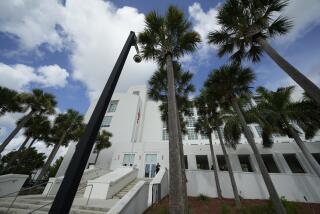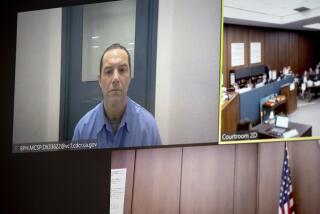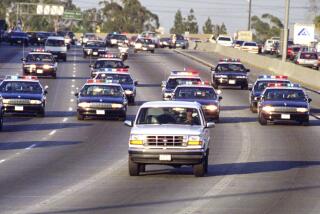Simpson Team May Change Its Strategy on DNA
- Share via
Throwing a fresh complication into the O.J. Simpson trial, defense sources said Monday that they are rethinking how they will react to DNA evidence in the case and may back off their publicly stated plans for a full-scale, pretrial assault on the scientific procedures used to test blood and hair samples.
Sources stressed, however, that the defense will not waive its right to contest the DNA evidence. Instead, sources said the defense has drafted a new set of plans for when and how the lawyers will make their objections.
The latest approach, they emphasized, is more likely to affect the timing and scope of the DNA challenge than the substance of it.
Robert L. Shapiro, one of Simpson’s lead attorneys, declined to comment publicly on the changing defense approach, but sources close to the case said one likely scenario would be to object to the admission of some DNA evidence at trial, rather than to demand the extensive hearing on the issue before jurors begin to hear evidence.
Depending on how prosecutors and Superior Court Judge Lance A. Ito react to a menu of defense options that will be filed today, one possible result is that opening statements in the trial--in which Simpson is vigorously contesting charges that he murdered Nicole Brown Simpson and Ronald Lyle Goldman--could now begin in early January.
“It’s possible,” Deputy Dist. Atty. Marcia Clark said of the earlier-than-anticipated date for opening statements. “They (the defense lawyers) have indicated that they will make a number of proposals, several alternatives they may propose regarding DNA.”
In court, remarks by Ito also appeared to suggest that the trial could get under way in January. Speaking to the panel of 24 jurors and alternate jurors who will hear the case, Ito delivered a new admonition on avoiding news media, and ordered them to return on Jan. 4, when the case could begin in earnest.
“Have a very happy holiday,” Ito said. “There’s a strong possibility we’ll have to sequester you. I still have not decided if and when.”
Although he was not more specific Monday, Ito added: “Take care of any pressing business. Make any arrangements you have to make. . . . Just like the Boy Scouts, I’d like you to be prepared.”
The defense’s final plans on approaching the DNA issue remained in flux late Monday as Simpson’s battery of attorneys continued to debate the best course. As he left court, Johnnie L. Cochran Jr., one of the lead lawyers in the case, confirmed that the defense wanted to present Ito with a number of options for handling the issue of DNA evidence but declined to comment further.
The prosecution’s DNA evidence consists of results from four different types of DNA testing, and defense attorneys may propose different approaches for the various tests. One test known as RFLP, for instance, is considered highly reliable and has been admitted in trials throughout the state. Others are newer and may be subject to more exacting defense scrutiny.
As a result, defense sources said the Simpson team may concede that the science underlying some of the tests is reliable while reserving the right to challenge other tests. In addition, defense sources say the team will not waive the right to object to the reliability of any of the tests based on their handling by investigators and lab technicians.
Prosecutors greeted news of the defense’s shifting approach warily, warning that they would not accept any proposal that would break up the trial or limit the prosecution’s ability to put on its best case.
“In order to waive the (DNA hearing), they have to concede the admissibility of the DNA evidence,” Clark said. “Also, that would require them to accept the statistical significance of the matches that were found.”
DNA analysis can yield powerful statistical evidence about the source of blood samples such as those at issue in the Simpson investigation. In some cases, DNA results can narrow the source of a particular sample to fewer than one person in millions, and if the defense were to accept those statistics, it would be giving in to potentially powerful evidence linking Simpson to the murder scene.
If, on the other hand, the defense reserved its right to object to the DNA evidence at trial, forgoing the hearing in January would not concede that the evidence could be used against Simpson.
“We want to make sure the waiver they give us is a true waiver,” Clark said--not merely an attempt to delay the matter until the middle of the trial.
Experts expressed doubt about whether Ito would agree to put off a DNA hearing until after jurors had begun to hear evidence in the case, though they agreed that such an approach would probably be desirable for the defense.
For one thing, experts said, it would allow Simpson’s lawyers to debut their attack on the handling of blood and hair samples before a jury and not show its cards to prosecutors in advance of the trial.
It also would play to the strength of a key defense witness, Dr. Edward Blake, a renowned DNA expert who has criticized the way samples were handled but would not be in a position to testify that the scientific techniques are suspect because he is the foremost advocate of some of those techniques and regularly testifies for prosecutors in DNA cases.
Finally, putting off or curtailing the hearing on DNA evidence would allow the case to move more quickly, consistent with a defense strategy to move to trial as swiftly as possible. That also would save Simpson a substantial sum of money that would otherwise go to paying legal bills for a hearing that could last a month or more.
Going straight to opening statements in the trial without a ruling on the admissibility of the DNA evidence would vastly complicate the prosecution case, and some experts predicted that prosecutors would not willingly make any such concession.
“The prosecution might very well oppose any delay in the resolution of those issues because the prosecution wants to know whether all of this evidence is admissible and the type of weight such evidence will have before they make opening statements,” said Peter Arenella, a UCLA law professor.
The jockeying over evidence in the Simpson case is not limited to the blood and hair samples. Later this week, Simpson’s attorneys will seek to prevent prosecutors from using any evidence of “marital discord” between Simpson and his ex-wife. And late Monday, prosecutors introduced a motion attempting to block the Simpson team from raising “remote, inflammatory and irrelevant character evidence regarding LAPD Detective Mark Fuhrman.”
Fuhrman testified at the preliminary hearing that he found a bloody glove outside Simpson’s Brentwood mansion hours after the murders. Since then, he has come under intense defense scrutiny, and has been accused of racism by Simpson’s attorneys. Through his lawyer, Fuhrman has denied those allegations.
While the defense wrestled with the issue of how to propose going ahead with the DNA evidence, Judge Ito handed it yet another setback, ruling that veteran prosecutor Christopher Darden can remain on the prosecution team despite objections from the Simpson camp.
The ruling regarding Darden’s participation in the case ends the defense challenge, which had been based on the claim that Darden’s presence on the Simpson team breached the wall that prosecutors said they had erected between the investigations of Simpson and his friend, Al Cowlings. Darden led the Cowlings probe, but Ito found that “there is nothing in the record which would support any finding of fundamental unfairness or lack of due process.”
That ruling was greeted enthusiastically by the district attorney’s office: “It’s official now,” Dist. Atty. Gil Garcetti said, smiling broadly at a news conference in which he was joined by Darden and Clark.
Darden, who said he already has been working to prepare for the trial, said he was pleased that Ito’s ruling eliminated any question about whether Darden had properly handled the grand jury proceedings.
“Judge Ito only affirms what we already knew,” he said, “that I acted appropriately during the grand jury hearing.”
Although it was not a basis for the legal objection to Darden’s assignment, defense attorney Cochran had suggested that Darden was being added to the team in part because Darden is black. Cochran, who also is African American, stressed that he had high regard for Darden’s legal skills but questioned the timing of his adversary’s appointment to the team, which came shortly after a predominantly black jury was sworn in to hear the case.
Monday, Darden said he would respond directly to Cochran’s comments.
“It doesn’t sit very well, and I was surprised to hear Mr. Cochran make that remark,” Darden said. “I’m personally offended by it, and I am preparing a letter to Mr. Cochran in which I will explain my views.”
Times staff writer Henry Weinstein contributed to this story.
More to Read
Sign up for Essential California
The most important California stories and recommendations in your inbox every morning.
You may occasionally receive promotional content from the Los Angeles Times.














